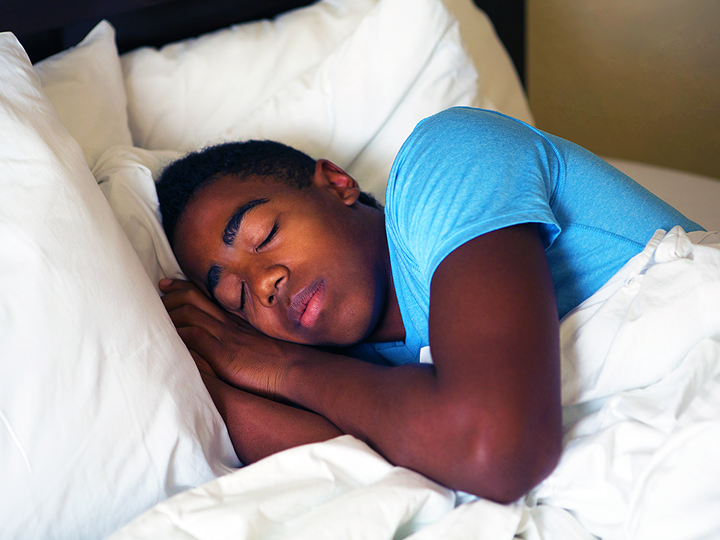Sleep routines for young people and teenagers
- 11-19 Years
- Sleep

Explore the topics on this page:
Establishing a sleep routine
It can be difficult to maintain a routine with teenagers as their brains are developing and they are wanting to be more independent.
Below are some ideas for how to tweak their bedtime routine to give them as much sleep as possible.
Dimming the lights and switching off devices such as the TV, games consoles, computers, and tablets 1 hour before bedtime. The blue light from the screens will keep your teenager’s brain awake for longer as it interrupts the production of melatonin, the hormone that helps control sleep patterns, in the body.
During the hour before bed, encourage quiet offline activities such as reading, listening to podcasts, or colouring.
If possible, try to make their bedroom a peaceful haven for sleep. This can be ensuring the bed is comfortable to sleep on and encouraging them to keep clutter to a minimum.
Set and maintain good sleep/wake times that will enable your teenager to get the 9 to 10 hours of sleep they need. Wake time is the most important and will need to wake at approximately the same time throughout the week. Although it may be tempting to let them sleep in until the afternoon, restrict the lie-ins to an hour at most.

Helping your teenager sleep through the night
It’s very common for teenagers to wake up during the night. This is a normal part of your teenagers development but it can be frustrating for parents.
If your teenager wakes up during the night and leaves their bedroom you should:
- Encourage them to go back to bed.
- Suggest they do a relaxing activity that does not involve electronics such as deep breathing, meditation or reading a book.
Need more specific support for your teenager?
If your teenager or young person needs more help or has additional needs, you can visit our specific section for extra support.
Tips to help your teenagers sleep routine
To reduce the likelihood of outbursts or arguments around bedtime, there are some things you can do outside of the bedtime routine that can help your teenager to develop healthy sleep habits and improve their overall quality of sleep.
Avoid caffeine after lunch - Caffeine is a stimulant that prevents sleep. It can cause your teenager to stay awake for longer and struggle to fall asleep. Caffeine is in drinks such as tea, coffee, energy drinks and fizzy drinks. If your teenager drinks these, try to limit their intake or avoid them all together after lunchtime.
Avoid eating a large meal before bedtime – This can prevent sleep. You should consider the best time to have a meal, if you are having a large meal, try to ensure that it is eaten over an hour before your teenager's sleep routine starts.
Encourage your teenager to only use their bed for sleeping - It can be tempting for your teenager to take naps or rest in their bed outside of bedtime. This can affect how easily they fall asleep and their quality of sleep. Encourage them to use a beanbag or comfy chair to rest in instead of their bed.
Exercise throughout the day, but not just before bedtime - Teenagers and young adults can have difficulty falling asleep if they have been inactive throughout the day. Try encouraging your teenager, where possible, to take part in sports and play outside. This can help to burn off energy. If your teenager isn’t very ‘sporty’, a walk in the fresh air or a little dance party can be helpful. However, exercise should be avoided directly before bedtime as this can make it harder for your teenager to calm down and prevent them from falling asleep.
Introduce calming activities during the day to help with stress - Stress can affect sleep. Adding calming activities such as journaling during the day to allow them to unwind, even 10 minutes can be helpful.

Last reviewed: 1 November, 2023
